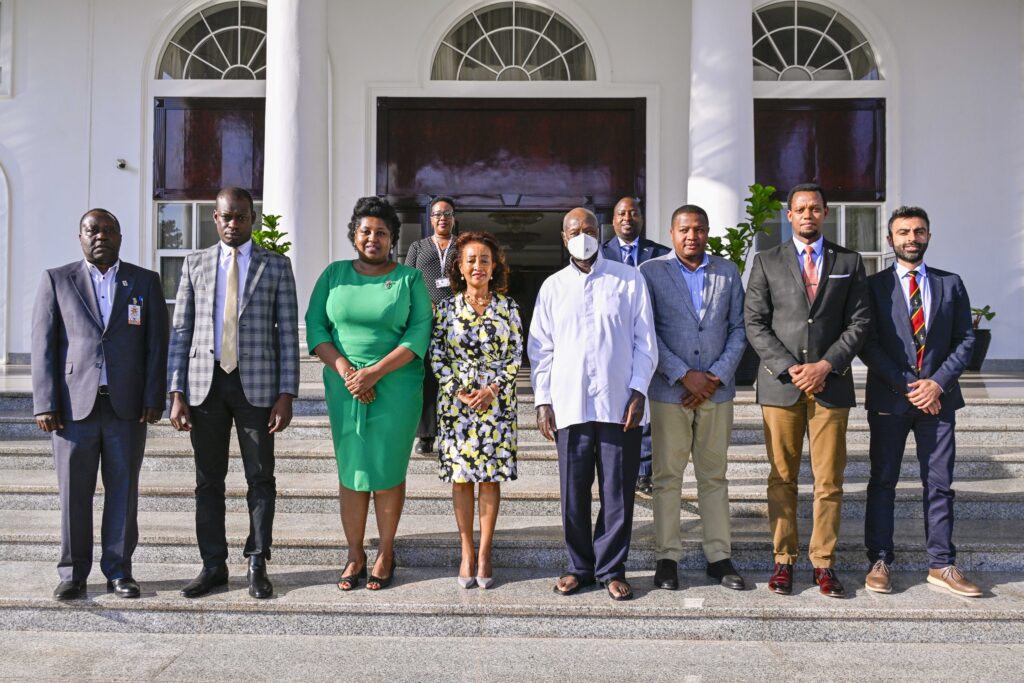
President Museveni has come out strongly against the taxation of hotels, saying the tourism sector is an export industry that should not be burdened with domestic-style taxes.
Meeting a delegation from the Uganda Tourism Association (UTA) at State House Entebbe on Tuesday , the President expressed concern upon learning that hotels which he called the backbone of tourism were being taxed similarly to local consumer businesses.
“Tourism is an export business because tourism is like the exports, it’s not an import, it’s an export,” the President said.
“You are exporting a service, like we are exporting milk. Me, I am a man of milk as you know, so our milk is going out and other products. And we don’t tax exports. So, this taxing of hotels the way you are talking about is really not correct.”
He added that he had not been aware of the current tax burdens affecting hotels.
“I was not aware that you are being taxed like that because this is an export. Mainly, it’s actually an export. So that’s number one,” he said.
The President also took aim at the way tourism businesses are being financed, arguing that the sector should not be expected to operate on commercial loans.
“Because it’s an export, it should not be relying on money from commercial banks for business, it should be relying on UDB, just like factories,” he said.
“If factories don’t borrow from commercial banks, why do you want tourism businesses to borrow from commercial banks? How will they succeed? It’s not correct, you should be dealing with UDB. I am going to take up all those because those are policy issues, they are not money issues. It’s a matter of proper understanding and classification.”
The meeting followed a request from UTA President Ms. Yogi Biriggwa, who appealed for structured support, including direct funding of Shs 800 million per year for the next three years to strengthen the association’s Secretariat and implement priority reforms.
“We respectfully request Shs 800 million annually for the next three years to strengthen the UTA Secretariat and implement priority institutional interventions,” she said.
“This funding will enable UTA to play its rightful role as the coordinating and unifying voice of the private sector in tourism, aligned with the aspirations of the National Development Plan IV and Uganda’s goal of reaching USD 4 billion in annual tourism receipts by 2030.”
The President welcomed the proposal and promised to take action.
“I will read the whole document and give orders in writing,” he said.
Ms. Biriggwa also presented a sector snapshot, noting that Uganda’s tourism industry is rebounding strongly following the COVID-19 shock, thanks to what she described as deliberate efforts by the President, the Government, and the Ministry of Tourism, Wildlife and Antiquities.
According to figures cited in the FY2025/26 Budget Speech, tourism earnings grew by 13.1% to $ 1.52 billion in the 12 months to March 2025.
She said that Tourist arrivals rose by 7.7% to 1.37 million, while domestic visits to national parks increased by 15.7%. Uganda now ranks 7th in Africa for MICE tourism, boosted by investments such as the new Speke Resort Convention Centre.
Despite this progress, she warned that deeper structural constraints are holding the industry back, particularly access to affordable finance.
“Commercial interest rates range from 20% to 25%, and even government-supported lenders such as UDB and Microfinance Support Centre offer rates between 12% and 16%, which remain too high,” she explained.
According to UTA’s findings, tourism receives just 3% of all private sector credit, and in 2023, the sector received only Shs 16.84 bn, just 1.3% of Uganda Development Bank’s Shs 610bn in disbursements. Noting that the non-performing loan rate in the tourism sector, as of May 2024, stood at 12.1%, more than double the national average.
On public funding, Ms. Biriggwa acknowledged a significant increase, from Shs 289.6bn in FY2024/25 to Shs 430bn in FY2025/26, along with Shs 2.2 trillion earmarked for supportive infrastructure such as roads, ICT, and security. However, she argued that tourism still receives less than 1% of the total national budget, despite contributing about 5% to GDP.
To match the sector’s economic weight, UTA proposed that direct funding be raised to at least 1% of the national budget, a shift that would support destination marketing, product development, quality assurance, and skilling.
In response to the call for improved connectivity to high-value destinations, President Museveni noted that infrastructure development is ongoing particularly in air transport.
“I know the airports like at Kidepo we are working with the government of Sharjah. We are building an airport there. In Kihihi, in the western side.
Then for Murchison Falls, there is an airstrip at Kakuba that can be developed. Even Mweya, there is an airstrip, but it’s not an international Airport,” he said.
“These tourists, they reach and need where they can land directly. With our own money, we shall develop that infrastructure, Kasese, Arua, Kayonza, Kihihi, and Kidepo.”
As the meeting concluded, the President committed to reviewing the UTA’s recommendations and addressing the broader policy gaps.
“I am going to take up all those because those are policy issues. Tourism is an export, and we should treat it that way.”
The meeting was also attended by Hon. Martin Mugarra Bahinduka, the Minister of State for Tourism, Wildlife and Antiquities.